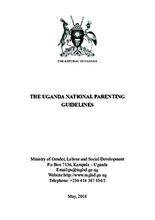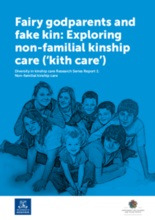Displaying 221 - 230 of 576
The aim of this study was to evaluate the social and cultural acceptability of the Winangay Tool to practitioners responsible for assessing kinship carers.
These Guidelines are for all persons taking care of children. The goal of these Guidelines is to empower parents, the family and community structures to effectively nurture children so that they can realise their full potential.
Reported here are findings from a recent partnership research project focused on optimizing grandparent contact and ongoing relationships with grandchildren after child safety concerns.
The researchers in this study conducted a systematic review with the aim of developing a better understanding of the psychosocial factors associated with the behavioral health of children in foster and kinship care.
The authors of this paper conducted a systematic review with the aim of developing a better understanding of the psychosocial factors associated with the behavioral health of children in foster and kinship care.
This article describes a dataset containing information on children exiting to kinship guardianship in California between 2003 and 2010.
This study explored stakeholder perceptions of barriers and facilitators to conversations about sexual health between foster/kinship caregivers and youth in foster care, with the goal of developing a brief, scalable sexual health training for caregivers.
This study utilizes self-report data from one kinship navigator federal demonstration project, which used a randomized control trial, to examine demographic characteristics for grandmothers under and over 55 years of age, whether grandmother caregivers (≥55 years) improve family resilience, social support, and caregiver self-efficacy, and which interventions improved outcomes for grandmothers (≥55 years).
This study examines the factors associated with guardianship breakdown for children who exited foster care to kinship guardianship in California between 2003 and 2010.
This research seeks to address the gap in attention paid to the care of children by family friends (non-familial kinship care) in Australia.


